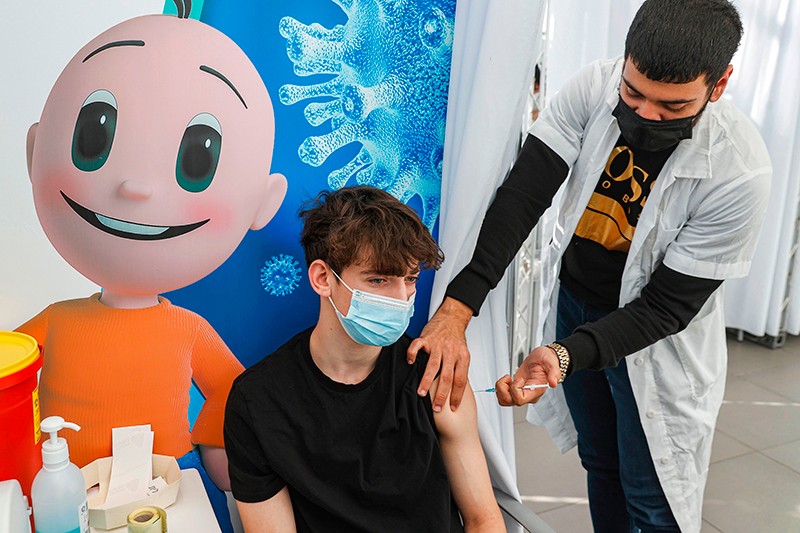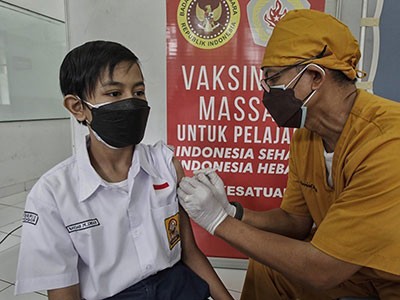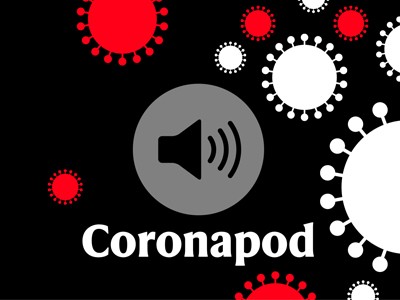The risk of developing inflammation of the heart muscle after receiving the Pfizer–BioNTech COVID-19 vaccine is very low, according to two large studies from Israel. The new studies indicate that teenage boys and young men are most at risk of developing the condition, known as myocarditis. But even in this group, the vast majority of cases are mild and people recover quickly.
In one study of more than 5 million people who had received the Pfizer–BioNTech COVID-19 vaccine, 136 developed myocarditis. The other study of more than 2.5 million people who received the shot identified just 54 cases of myocarditis.
Ran Balicer, a co-author of the second study and an epidemiologist at Israel’s largest health-care provider, Clalit Health Services in Tel Aviv, hopes the findings will “help alleviate some of the worries around the risks associated with vaccination in the younger age groups and put an appropriate clinical context to them”.
Myocarditis concerns have fuelled anti-vaccine sentiments and influenced decisions about giving mRNA vaccines to children in the United Kingdom, Denmark and Sweden.
Massive survey
The studies, published this week in The New England Journal of Medicine1,2, analysed data from Israeli residents aged 16 and older who received at least one dose of the COVID-19 vaccine made by drug company Pfizer in New York City and biotechnology firm BioNTech in Mainz, Germany, between December 2020 and May 2021.
One of the studies1 was a nationwide analysis, in which cardiologists closely reviewed the records of people hospitalized with suspected myocarditis. “We dissected every case,” says co-author Dror Mevorach, a physician-scientist at Hadassah Medical Center in Jerusalem.
The researchers identified 136 cases of myocarditis reported within one month of having a Pfizer shot. Of these, 95% were mild, but one person died.
The researchers found that up to 4 in 100,000 men developed myocarditis after receiving their second shot of the Pfizer–BioNTech vaccine; but the incidence for women was fewer than 1 in 100,000. Overall, fully vaccinated individuals were about twice as likely to be diagnosed with myocarditis as were unvaccinated individuals.
But young men aged 16–19 had a 15 in 100,000 chance of developing myocarditis after their second shot. The vast majority of these cases were mild and eventually resolved. The researchers also found that myocarditis was more likely to develop after the second vaccine dose than the first.
The second study2 observed similar trends, using a slightly different approach. Balicer and his co-authors analysed data from some 2.5 million people insured by Clalit Health Services, and asked cardiologists to review hospital records. They found that 2 out of every 100,000 people who received at least one Pfizer shot developed myocarditis, and that the incidence increased to almost 11 out of 100,000 among men aged 16–29. Overall, 76% of the cases had mild symptoms and 22% had intermediate symptoms.
In line with other studies
The results are “in sync with what we have seen before”, says Fiona Russell, a paediatrician and infectious-diseases epidemiologist at the University of Melbourne in Australia.
A study3 of US military personnel by Leslie Cooper, a cardiologist at the Mayo Clinic in Jacksonville, Florida, and his colleagues, published in June, identified 23 cases of myocarditis in men aged 20–51 who had received an mRNA vaccine, working out to 8 cases per 100,000. All of the men recovered. The same month, the US Centers for Disease (CDC) Control and Prevention reported that it had identified 5 cases out of 100,000 in men aged 18–24, rising to 6 cases per 100,000 in male adolescents aged 12–17. Most people who developed myocarditis recovered quickly, according to the CDC.
The fact that the risk observed in young men in Israel is slightly bigger than that seen in the United States could be attributed to the active surveillance effort of the Israeli studies, which would have caught more cases, says Mevorach.
He says the new studies clearly show that the benefits of vaccination against COVID-19 outweigh the risks for people aged 16 and older developing myocarditis. Previous research4 co-authored by Balicer found that in this age group, becoming infected with SARS-CoV-2 made a person 18 times more likely to develop myocarditis — a much more significant risk than is observed following vaccination.
The comparison is less clear for younger age groups, says Russell — meaning that their risk of developing myocarditis might be increased more by the vaccine than by the disease, particularly because children rarely develop severe COVID-19.
More data needed
Biykem Bozkurt, a cardiologist at Baylor College of Medicine in Houston, Texas says more data are needed to compare the risks of myocarditis between vaccinated and unvaccinated people under 12. But Bozkurt says it’s possible that the increased risk of myocarditis “is clustered around puberty and adolescence” in young men, which would mean a lower risk in children under 12.
The mechanism by which myocarditis develops has not yet been studied in detail, but previous animal studies5 suggest that testosterone could aggravate the inflammatory response, says Leslie Cooper, a cardiologist at Mayo Clinic in Jacksonville, Florida.
It is important that the link between myocarditis and mRNA vaccines in young men is investigated further, says Russell.
Because of concerns around the rare side effect, the UK government decided in September that it would not recommend that all 12–15-year-olds get vaccinated. Earlier this week, Denmark announced that they would stop administering the mRNA vaccine developed by Moderna in Cambridge, Massachusetts, to those aged 12–18, while Sweden took the same action for 12–20-year-olds. Both continue to offer the Pfizer shot to those age-groups.
Regulatory bodies in regions including the European Union at large and Australia continue to recommend both vaccines for children aged 12 and older. Pfizer has said their vaccine is safe for children aged 5 and older and have shared their clinical trial data with the United States Food and Drug Administration, with plans to formally request emergency-use authorization for that age-group in the coming weeks.
"low" - Google News
October 08, 2021 at 01:25PM
https://ift.tt/3FqoHP9
Heart-inflammation risk from Pfizer COVID vaccine is very low - Nature.com
"low" - Google News
https://ift.tt/2z1WHDx
Bagikan Berita Ini

















0 Response to "Heart-inflammation risk from Pfizer COVID vaccine is very low - Nature.com"
Post a Comment